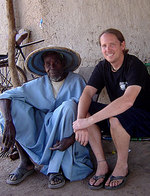Making Poverty History: Lessons from Farming Families in Mali
Scott Lacy
Tuesday, 29 Mar 2011 at 7:00 pm – Sun Room, Memorial Union
Scott Lacy moved to Mali in 1994 as a Peace Corps volunteer, returned in 2002 as a Fulbright scholar, and continues to work extensively in the West African country. Lacy's nonprofit, African Sky, emerged from a project to build a three-room schoolhouse in his rural host village. The community development organization has service programs in education, community health, food security, and community arts in Mail, with a focus on sustainability living. At Emory and Fairfield Universities, Scott Lacy has researched such issues as sustainable development, food production, and the intellectual property rights associated with participatory plant breeding. He earned his PhD in anthropology at the University of California, Santa Barbara, where he taught in the Department of Black Studies as a Faculty Fellow. Part of Poverty Awareness Week and the Live Green! Sustainability Series.For more information about African Sky: africansky.org
Cosponsored By:
- Engineers Without Borders
- ISUganda
- International Student Council
- Student International Medical Aid Club
- UNICEF @ ISU
- Committee on Lectures (funded by Student Government)
Stay for the entire event, including the brief question-and-answer session that follows the formal presentation. Most events run 75 minutes.
Sign-ins are after the event concludes. For lectures in the Memorial Union, go to the information desk in the Main Lounge. In other academic buildings, look for signage outside the auditorium.
Lecture Etiquette
- Stay for the entire lecture and the brief audience Q&A. If a student needs to leave early, he or she should sit near the back and exit discreetly.
- Do not bring food or uncovered drinks into the lecture.
- Check with Lectures staff before taking photographs or recording any portion of the event. There are often restrictions. Cell phones, tablets and laptops may be used to take notes or for class assignments.
- Keep questions or comments brief and concise to allow as many as possible.




